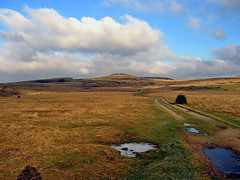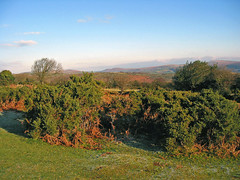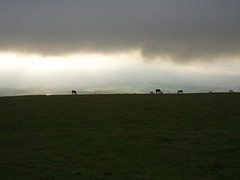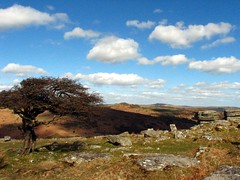
My father grew up in a village on the edge of Dartmoor, and knew parts of the moor intimately. He always said that Eden Phillpotts described the moor as it really was; the people too. I only have a few of his novels, but I am always on the lookout for more. Of course, he was writing largely at the beginning of the 20th century and his novels seem very melodramatic in this day and age, but are worth reading for the picture of Dartmoor they paint, a Dartmoor of a byegone age. He can be compared with Thomas Hardy with his faithful depiction of the countryside of his youth. Dad always said when he was a lad everyone spoke still using "thee" and "thou". With the advent of radio, I feel it must have had a big impact on dialect and for the worse, I fear, although I realize that languages are always developing.

Eden Phillpots was born on 4th November 1862 and nearly made his centenary, as he died on 29th December 1960. What a breadth of living that must have been - starting in the high Victorian period, when even bicycles were something of the future, and ending with the start of the space age. Although born in India, he was educated in Plymouth and had Dartmoor in his blood. During the space of his lifetime, he spent ten years as an insurance inspector, before studying for the stage and becoming the author of over 200 books, . The subject of one of his novels, from the Dartmoor cycle, Widecombe Fair, was also produced as a comic play, The Farmer's Wife and was also a silent movie of that name directed by Alfred Hitchcock in 1927.

It is not surprising to learn that such a man of Dartmoor was for many years President of the Dartmoor Preservation Society. He was a friend of Agatha Christie and Arnold Bennett, who once remarked, "You have chosen a damn fine theatre for your work". He was a keen field naturalist and took careful notes of anything that he found interesting, so no wonder his descriptions of the Dartmoor I know and love cannot be faulted.

I will end this with one of his descriptions, to whet your appetite for his writing. This is from The River (1902):
"To Crockern Tor he passed along, where nightly rains under a morning of pure azure glittered around him. It was as though a mist had been caught out of the air, spread upon the waste and woven thereinto with sunbeams. The dawn light mellowed many a league of sere grasses until earth's habit shone like cloth of gold upon the shoulders of the hills against blue gloom and rosy fore-glow in the western sky. Opulence of tonem intense purity of each great colour-wave marked that crystal hour; only the granite, peeping grey from red fern and rusty heath, lifted prisms of quartz to the direct sun-rays and, discovering their rainbow secrets, scattered them seperately."

Amongst his Dartmoor novels are:
Children of the Mist (1898)
The River (1902)
The American Prisoner (1904)
The Whirlwind (1907)
The Mother (1908)
The Virgin in Judgement (1908)
The Three Brothers (1909)
The Thief of Virtue (1910)
The Beacon (1911)
The Forest on the Hill (1912)
Orphan Dinah (1920)


